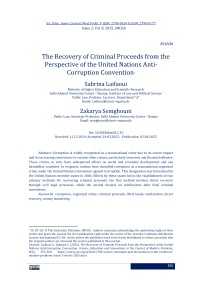The Recovery of Criminal Proceeds from the Perspective of the United Nations Anti-Corruption Convention
Автор: Laifaoui S., Zakarya S.
Журнал: Science, Education and Innovations in the Context of Modern Problems @imcra
Статья в выпуске: 2 vol.8, 2025 года.
Бесплатный доступ
Corruption is widely recognized as a transnational crime due to its severe impact and its increasing connections to various other crimes, particularly economic and financial offenses. These crimes, in turn, have widespread effects on social and economic development and can destabilize countries. In response, nations have classified corruption as a transnational organized crime under the United Nations Convention against Corruption. This designation was formalized by the United Nations member states in 2004. Efforts by these states led to the establishment of two primary methods for recovering criminal proceeds: the first method involves direct recovery through civil legal processes, while the second focuses on confiscation after final criminal convictions.
Corruption, organized crime, criminal proceeds, illicit funds, confiscation, direct recovery, money laundering
Короткий адрес: https://sciup.org/16010416
IDR: 16010416 | DOI: 10.56334/sei/8.2.25


